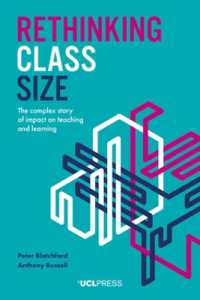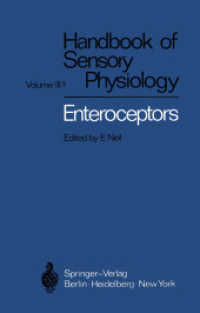Full Description
The Routledge International Handbook of Autoethnography in Educational Research presents diverse and rigorous contemporary research at the intersection between autoethnography and educational research.
The handbook investigates the bidirectional connection between autoethnography and educational research in relation to four themes: enhancing teaching and teacher education with autoethnography; enlarging doctoral study and supervision with autoethnography; conducting identity work and relationship-building via autoethnography; and promoting social justice through autoethnography. In addition to the synthesising introduction and conclusion chapters, the 27 main chapters in the handbook cover current research from Africa, Aotearoa New Zealand, Australia, Bangladesh, Canada, Spain, the United Kingdom, the United States and Venezuela. The chapters present novel applications of several key concepts and research methods, including activism, arts-based research, critical reflection, decolonising feminism, doctoral study and supervision, hybrid identities, Indigenous research, migrant education, racism, researcher self-efficacy, teacher identity, visual autoethnography and writing as voice.
This book will be of use to all researchers, and doctoral and Masters students, using qualitative and autoethnographic methods in Education and related fields.
Contents
1. Pedagogies, Positionality and Power: Maximising the Mutual Meanings of Autoethnography and Educational Research; Section 1: Enhancing Teaching and Teacher Education with Autoethnography: Introduction 2. Illuminating the Epiphany: Reflecting on Disability and Inclusion in Education 3. Five Years After: Constructing a Robust Teacher Identity through Autoethnography as Professional Development 4. Uncovering Buried Treasure: Digging Deep to Decolonise Research and Teaching Practice in Aotearoa New Zealand 5. Evolving Teacher Education Practice through Collaborative Arts-Based Autoethnography 6. Teacher Identity: The Potential of Autoethnographic Research for Restoration, Renewal and Retention; Section 2: Enlarging Doctoral Study and Supervision with Autoethnography: Introduction 7. Effective Autoethnographic Exploration to Enhance an Educational Doctoral Researcher's Self-Efficacy: Journey to Becoming a Researcher 8. Visual Autoethnographic Analysis for Case Study Understanding 9. The Strengths and Applications of Collaborative Autoethnography and Phenomenography through Methodological Fusion in Educational Research 10. Conversations with My Dog: Anthropomorphising Self-Narrative as a Researcher's Autoethnographic Tool When Writing Her Thesis and Conducting Grief Work 11. An Autoethnographic Analysis of Mental Health (PTSD) Recovery, Empowerment and Activism through University Education 12. A Comparative Autoethnographic Lens on the Doctorate as Told by a Supervisor and a Doctoral Candidate 13. An Autoethnographic Exploration of Hybrid Identities within Education 14. Slipping and Sliding: Autoethnographic Reflections on Supervising, Examining and Evaluating Autoethnography; Section 3: Conducting Identity Work and Relationship-Building via Autoethnography: Introduction 15. This is Sweet but Uncomfortable: An Autoethnography of Being African in American Classrooms 16. Susurrations of a Swansong: Autoethnographic Sense-Making by an Australian Professor of Education Working on Identity Shift and Relationship Reshaping 17. Voicing My Writing, Writing My Voice: Autoethnography as a Way to Explore and (Re)Think My Personal and Academic Self 18. The Formation of an Identity in a Multicultural Household: An Autoethnography 19. Self, Reflexivity and the Crisis of "Outsidedness": A Dialogical Approach to Critical Autoethnography in Education? 20. Looking Beyond the Gaze: A Reflective Faculty Learning Experience 21. Practical Identities as Sources for Exploration: Autoethnography as Critical Reflection 22. The Triple Nexus between Identity Work and Relationship-Building: A Collaborative Autoethnography about University Continuing Education Programs for Venezuelan Engineers; Section 4: Promoting Social Justice through Autoethnography: Introduction 23. Co-Constructing Testimonios: Critical Narratives of Latinx Student College Success 24. Revealing Racism is Ugly and Uncomfortable: A White Teacher's Autoethnography 25. Autoethnography as Activism: Social Media, Influence and Community Building 26. Decolonising Feminism in Class: An Autoethnography of a Bangladeshi Feminist Woman 27. They Have Lessons to Teach Me: Critical Reflection and Autoethnography in an Australian Adult Migrant English Program 28. Kaupapa Māori Autoethnography 29. Identifying Implications and Issues: Selected Lessons Learned from Intersecting Autoethnography and Educational Research








